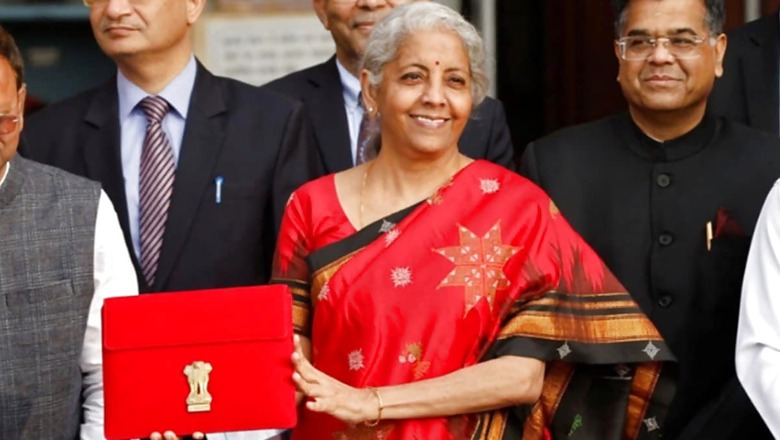
views
The Union Budget 2023-24 is likely to be presented on July 22, according to a CNBC-TV18 report citing sources. Finance Minister Nirmala Sitharaman will present the Budget, which will be her 7th annual financial statement in a row. It will also be the full budget for the year 2024-25.
However, a final official decision on the date is yet to be taken by the government.
The government will present the Economic Survey on July 3 which is the last day of the special session of parliament, according to the sources.
This will be the first full budget of the Modi Govt 3.0. The monsoon session will take place between July 22 and August 9.
Nirmala Sitharaman on June 12 took office for her second consecutive term as the minister of finance and corporate affairs. On Thursday, the work relating to the preparation of the regular union budget 2024-25 commenced.
After taking charge as the finance minister in the Modi 3.0 government, Sitharaman highlighted the objectives and outlined how the 2024 full budget will include various aspects of the Indian economy.
As Modi 3.0 government gets down to prepare its final Budget for FY 24-25, North Block, which houses the finance ministry, will be in ‘quarantine’ from Thursday until the presentation of the Budget in July.
The finance minister had presented an interim budget on February 1.
Nirmala Sitharaman’s Journey As India’s Finance Minister
Sitharaman, who is credited with carrying forward second-generation reforms in her last term, would be creating a record by presenting the seventh budget in a row and the sixth full budget consecutively.
She has many records to her credit in her political career. She created a record when she was appointed as the first female Raksha Mantri, or Defence Minister, in 2017. Before that, she was an industry and commerce minister.
When her mentor Arun Jaitley (finance minister 2014-19) took ill, Sitharaman was given the charge of the finance portfolio in the newly re-elected Modi government after the 2019 general elections.
She became the first full-time woman finance minister in independent India.
Earlier, Indira Gandhi had held finance as an additional portfolio for a short duration when she was the prime minister of India.
Soon after taking over, the first major reform was a cut in base corporate tax to 22 per cent from 30 per cent to prop up the economy hit by demonetisation and GST implementation.
The following year, India weathered the Covid-19 pandemic with an array of policy measures announced for the poor and continued its tag as the fastest-growing major economy and a ‘bright spot’ in the world economy.
To overcome the hardship during the pandemic, the government announced a special economic package worth Rs 20 lakh crore equivalent to roughly 10 per cent of India’s GDP.
She steered the economy from nearly 24 per cent contraction in the first quarter of FY21, to the fastest-growing world economy.
Despite the fiscal expansion, she continued to follow the path of fiscal consolidation and was successful in bringing down the fiscal deficit to 5.6 per cent of GDP, from the earlier estimate of 5.8 per cent in FY24.
She also set a record by presenting the sixth budget in a row — five annual budgets and one interim — a feat achieved so far only by former Prime Minister Morarji Desai.
After the Modi government came to power in 2014, Arun Jaitley took charge of the finance ministry and presented five budgets in a row from 2014-15 to 2018-19.
In 2017, Jaitley departed from the colonial-era tradition of presenting the budget on the last working day of February to the 1st of the month.
Following the footsteps of her mentor, Sitharaman also did away with the traditional budget briefcase and instead went for a bahi-khata with the National Emblem to carry the speech and other documents.
Born in Madurai on August 18, 1959 to Narayan Sitharaman (who worked in the Railways) and Savitri (a homemaker), Nirmala Sitharaman studied economics at Tiruchirapalli’s Seethalakshmi Ramaswami College.
She then moved to the capital to pursue her Master’s and M.Phil in the subject from Jawaharlal Nehru University (JNU).
But before Sitharaman forayed into politics, she was part of the corporate world in the UK, where she was living with her husband Parakala Prabhakar.
The two had met while studying at JNU, and tied the knot in 1986.
They have a daughter, Parakala Vangmayi.
Sitharaman’s political career began in 2008 when she joined the BJP (she returned to India in the early 1990s), and in two years became the party’s second woman spokesperson after Sushma Swaraj, fielding questions from journalists at the party headquarters and also became a familiar face on television debates.
Before taking the political plunge, she served as a deputy director of the Centre for Public Policy Studies in Hyderabad and also started a school in the city.
From 2003 to 2005, she was also a member of the National Commission for Women.




















Comments
0 comment